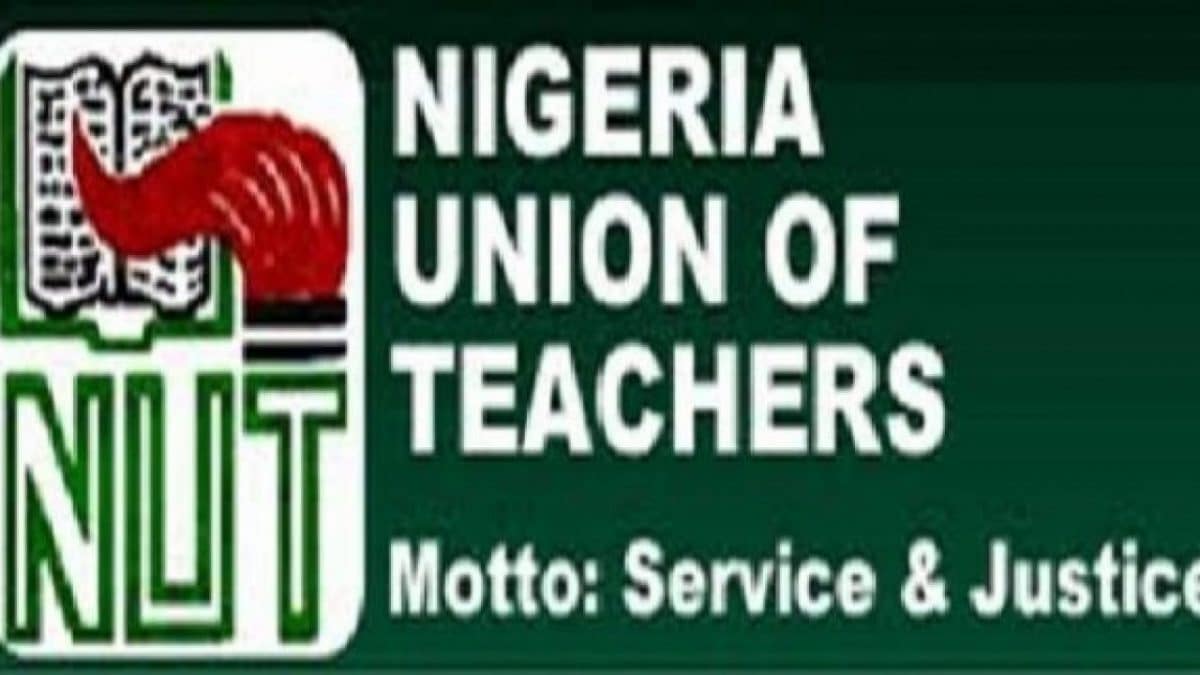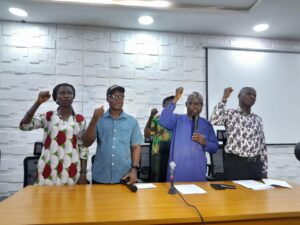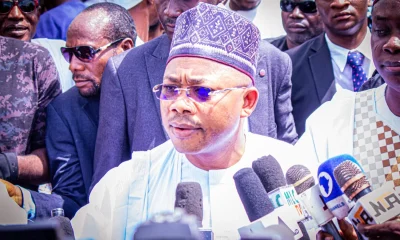Education
ASUP Renews Call for a National Polytechnic Commission

The Academic Staff Union of Polytechnics (ASUP) has renewed call for the establishment of a National Polytechnics Commission to regulate and oversee the affairs of polytechnic education in the country.
Mr Anderson Nzebe, ASUP National President, made the call while rounding off his working visit to the Federal Polytechnic, Ado-Ekiti, on Sunday.
Nzebe said the call for such commission was to guarantee the desired growth and development in the nation’s polytechnic education sector.
According to him, ASUP needs such commission as against the present system of being regulated by a body, which oversees over 600 other institutions with uncorrelated needs and policies.
Nzebe expressed the need for all stakeholders within and outside the sector to work for unity of purpose to deliver a National Polytechnic Commission that would save the sector from abject neglect and total collapse.
The ASUP President also stressed the need to strengthen industrial harmony between Trade Unions within the polytechnic sector and institutional managements as regards labour management relations.
“Such a synergy is needed in salvaging the polytechnic sector from its perennial neglect and impulsive non-uniform policies which might soon lead to a looming collapse of the sector,” he said.
Nzebe praised the institution’s Rector, Dr Dayo Oladebeye, for his show of love and efforts toward promoting the union’s agenda.
He assured the institution that the union would do its best to always work hand in glove with institutional managements in very peaceful labour-management relations.
Nzebe said the union had been working within the dictates of its constitutional provisions and the overall best interest of the polytechnic sector.
He listed the exertion of pressure on the Federal Government for the reconstitution of governing councils of federal polytechnics and campaign for increase of capital allocation to the institutions as parts of its earlier efforts.
Responding, Oladebeye appreciated the ASUP president for deeming it fit to pay a working visit to the institution.
According to him, we are happy this visit is devoid of confrontation but on how to concretise the industrial harmony between the union and the management of the polytechnic.
Oladebeye bemoaned the observed neglect which Nigerian polytechnics have suffered chiefly resulting from lack of a polytechnic commission.
“Such a commission in place will strictly address the needs of polytechnic education in comparison with its universities and colleges of education counterparts among others.
The rector promised to always do his best, as he had always done to support the unions’ agenda within the context of available resources in his institution.
Mrs Kehinde Ekanem, the institution’s Registrar, appreciated the union representatives for the honour done to the polytechnic through the visit.
She enjoined the union to always prioritise consultation, consolidation and consideration to ensure a smooth-running and rancour-free learning environment. (NAN)
Education
UNICAL VC Promises to Resolve Dentistry Students’ Crisis

From Ene Asuquo, Calabar
The Vice Chancellor of the University of Calabar, Prof. Florence Obi has promised that she would do everything humanly possible to ensure that the ongoing crisis in the institution’s Department of Dentistry, is resolved.
Prof.
Obi made the promise in Calabar during a press briefing, stressing that she will resolve the crisis before leaving office.She explained that the problem predates her administration, and pledged to intensify efforts to rectify the crisis.
She added that the crisis was as a result of the Medical and Dental Council of Nigeria (MDCN)’s refusal to induct 2016 Dentistry students of the institution.She also debunked claims circulating on social media that the institution’s Dentistry programme has lost its accreditation, describing the reports as “misinformation and distortion of facts,” clarifying that the programme remains fully accredited and no students have been directed to transfer to other universities.
“At no point did the University ask Dentistry students to seek transfers to other institutions, nor were they advised to ‘go and learn a trade’ as falsely alleged online,” the VC stated.
“I will feel very bad if I leave without solving this problem and the students are left hanging without knowing their fate. I won’t be fulfilled,” she said.
She reaffirmed the University’s commitment to ensuring all Dentistry students graduate and are duly licensed as dental surgeons.
She noted that the Dentistry programme commenced in the 2013/2014 academic session, and in November 2019, the University secured pre-clinical accreditation from the MDCN and full clinical accreditation was subsequently granted in December 2022.
The VC added that the university’s synergy and partnership with the Minister of Education and the Tertiary Education Trust Fund (TETFund) to upgrade its facilities.
“All we asked for is time to engage with other institutions, update the Medical and Dental Council of Nigeria (MDCN), and follow through on due processes,” she noted.
Speaking further, Obi said that some of the affected students demanded to be transferred to the Department of Medicine and Surgery but said it was not the solution as the department was already saturated.
She urged the affected students to remain calm, noting that the university was doing everything possible to resolve the issues before the end of her tenure.
Education
NUT Reaffirms Commitment to Teachers’ Professional Development in Kwara

From Abdullahi Abubakar, Ilorin
The Nigeria Union of Teachers (NUT), Kwara State Wing has restated its commitment to strengthening the professional growth of teachers across the State, to enhance the quality of education delivered in public schools. Speaking at the opening of a three-day capacity-building workshop in Ilorin, the State Chairman of the Union, Comrade Yusuf Wahab Agboola, noted that continuous training of teachers remains a vital component of educational reform and improved classroom delivery.
The training, organised in collaboration with the NUT National Secretariat, is targeted at selected teachers and focuses on the “Study Circle Conveners’ Model”—a grassroots strategy for enhancing peer-to-peer learning and participatory leadership within the education sector.
Comrade Agboola explained that the workshop aims to equip teachers with practical skills in collaborative learning, peer engagement, and innovative teaching practices. He expressed optimism that the training would promote professional bonding among teachers and foster collective solutions to challenges facing the education sector.Also speaking at the event, the National Coordinator of the NUT Study Circle Project, Comrade Solomon Igbelowowa, traced the initiative’s roots to 1985 when it was introduced in Nigeria by the Swedish Teachers Association, having recorded success in Sweden and other parts of the world. He commended the Nigerian Union of Teachers for sustaining the project over the years and urged participants to engage fully and make the most of the training opportunity.
The workshop was officially declared open by the National President of the NUT, Audu Amba, who was represented by the 3rd National Vice President, Bashir Oyewo.
He encouraged teachers to approach the sessions with dedication and punctuality.
Education
JAMB Sets 150 Cut-off Mark for University Admissions

By Tony Obiechina Abuja
The Joint Admissions and Matriculation Board (JAMB) has fixed 150 as the minimum cut-off mark for admission into Nigerian universities for the 2025/2026 academic session.
The decision was reached on Tuesday during the 2025 Policy Meeting on Admissions, held at the Bola Ahmed Tinubu International Conference Centre in Abuja, with stakeholders from various tertiary institutions in attendance.
According to JAMB, 140 was approved as the minimum score for colleges of nursing sciences, while polytechnics, colleges of education, and colleges of agriculture will admit candidates with a minimum score of 100.
“The minimum admissible scores for admissions for the next academic session have been fixed at 150 for universities, 100 for polytechnics, 100 for colleges of education, and 140 for colleges of nursing sciences by the stakeholders (Heads of Tertiary Institutions),” JAMB announced via its official X account.





















